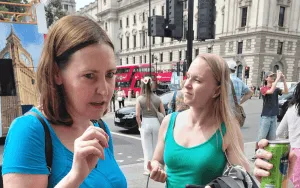Labour’s shadow minister for disabled people has called on her party to come up with its own alternative to the government’s flawed universal credit benefit system.
Marsha de Cordova (pictured) moved further this week than any of her shadow frontbench colleagues at Labour’s annual conference in Liverpool towards the idea of scrapping universal credit completely.
She told Disability News Service (DNS): “I believe Labour needs to come up with its own alternative.
“The party are not quite as close [as I am] to saying stop and scrap but you know what, if something isn’t working maybe there is no value in tinkering at the edges.”
She said that Labour’s policy – to “pause” the rollout of universal credit and fix its flaws – was set last year, before the country had seen a “hollowing out” of the new system that had caused “so much pain and misery to the people I represent and disabled people”.
She was speaking after her boss, shadow work and pensions secretary Margaret Greenwood, was criticised by disabled activists for a “lacklustre” conference speech in which she called on the government to “stop the rollout of universal credit and fix its many flaws”.
Activists, led by the grassroots group Disabled People Against Cuts, have been calling for Labour to change its position and promise to scrap universal credit (see separate story).
De Cordova said the “massive cliff edge” caused by the imminent “managed migration” process – which will begin next year and will eventually see hundreds of thousands of disabled people forced to end their existing employment and support allowance (ESA) claims and apply instead for universal credit – had to be a campaigning priority for her party.
Greenwood also announced this week a lengthy review of the party’s social security policy, which de Cordova said was “quite a brave and bold move”.
She said: “It is saying the system is broken, let’s not tinker, let’s have a real free think about what it should look like.”
In a fringe meeting earlier in the week, she had told Labour supporters that the social security system “should be viewed in the same light as the NHS. That’s how important it is.”
She also said that she wanted Labour to mark in some way the 10th anniversary of the introduction of ESA and the hated work capability assessment (WCA), which will take place on 27 October.
She told DNS that ESA/WCA had not been perfect when the New Labour government had introduced it in 2008, but the Conservative-led coalition had sought from 2010 to turn it into “something that was a cruel and inhuman process that disabled people had to endure”, while the government had tried to “demonise” claimants, creating “a hostile environment for disabled people”.
She had earlier told a Disability Labour fringe meeting: “Like many of you here, we know that that assessment regime has caused pain, has caused suffering and more importantly has taken people’s lives and we cannot let that day go past without marking it in some way.
“But also we cannot let it go past without calling out and shaming this cruel, evil Tory government for what they have done with that work capability assessment.”
De Cordova appeared to go further than last year’s general election disability manifesto on the question of benefit sanctions.
The party’s policy is to replace the government’s “punitive” sanctions regime but not to scrap all sanctions.
But de Cordova told DNS: “There’s no evidence out there that suggests sanctions work for disabled people.
“With that evidence before you, therefore, you should respond and act accordingly.”
When DNS asked whether that meant she was suggesting there should be no sanctions for people claiming ESA or any equivalent benefit, she said: “That’s something I would like to see happen, personally, absolutely.”
De Cordova had also been outspoken in a meeting held as part of The World Transformed, the festival organised by the left-wing group Momentum on the edges of the Labour conference.
She had told the meeting that the government should feel ashamed for creating a “hostile environment” for disabled people and that it had been “hell bent on demonising disabled people for the last eight years”.
But she then said that she blamed “the last Labour leadership” for the government’s lack of shame over its actions.
De Cordova said: “I blame the last Labour leadership for that because they chose not to be the voice for the voiceless.
“That’s why I sit here and say I will do my very best to be your voice.
“Three years ago, the Labour leadership voted against preventing cuts to social security for disabled people.
“It’s shocking that that happened but believe me, I was there, it did happen.”
She was referring to a crucial Commons vote on the government’s welfare reform and work bill, in which 48 Labour MPs – including Jeremy Corbyn (now the Labour leader), John McDonnell (now shadow chancellor) and Greenwood – all defied the party whip and voted against the bill, when interim leader Harriet Harman had ordered them to abstain.
Two months later, Corbyn was elected Labour leader.
A key element of last year’s disability manifesto was Labour’s pledge to incorporate the UN Convention on the Rights of Persons with Disabilities (UNCRPD) into UK law.
This would mean providing a legal right to independent living, and a commitment to move towards a fully inclusive education system and the closure of all special schools, as well as many other policy commitments, such as significant reform of discriminatory laws on detaining people with mental health conditions against their will.
But De Cordova told DNS that it was unrealistic to put a time limit on how long all of this would take to incorporate into UK law, and she accepted that it would be a “long-term project” and an “aspiration”.
She said: “If we are talking about creating a fully inclusive society for the many and not the few, then that has to be the aspiration.”
On the need for a right to independent living, DNS told her of the case of Laki Kaur, a young disabled woman who has spent more than 100 days in an east London hospital since being told she was well enough to be released after treatment for blood poisoning, because of the lack of suitable wheelchair-accessible housing.
De Cordova said: “Imagine that in our society, under a Tory government.
“That is what is happening to disabled people every day across the country. It’s a shame, it’s a disgrace, it’s a scandal.”
She had earlier told the Momentum fringe meeting: “There is a light at the end of that tunnel because Labour in government will ensure that we incorporate the UNCRPD into domestic legislation so that we can travel and use public transport, so that we can access the social security system, so that we can go into work and stay in work, and we will aim to remove those barriers to discrimination when in work.”
She told DNS that she wanted to see a change in employer attitudes to disabled people.
One of her hopes is that a Labour government will ensure that all employers with more than 250 employees will have to report on how many disabled people they employ.
Labour has already said that it wants to see an expansion of the Access to Work (AtW) scheme, extending it to cover those in self-employment and volunteers, she said.
And she reminded a fringe meeting this week that a Labour government would have to look at removing the “arbitrary” AtW cap, which led to the government being challenged in the high court under the Equality Act.
Asked if there had been too much carrot and not enough stick from the government when it came to pushing employers to improve their policies on employing disabled people, she told DNS: “All the focus from governments, the Tories especially, is always on the individual. Not much effort has gone on employers.”
She pointed to the government’s “shoddy” Disability Confident jobs scheme, which allows employers to sign up to the programme without employing a single disabled person.
DNS reported in July how nearly 7,000 employers that signed up to the scheme had promised to provide just 4,500 new jobs for disabled people between them.
The scheme has three levels – Disability Confident Committed (the entry level), Disability Confident Employer and Disability Confident Leader (level three) – but it is only at level three that employers’ pledges and claims on employing disabled people are assessed independently.
De Cordova suggested that Labour would replace Disability Confident, or at least overhaul it.
She said: “Any initiative that Labour would have would have to have good independent evaluation as part of it, there has got to be some good quality assurance, it’s got to be of good quality, and actually it’s got to be something that disabled people and employers feel confident about, and actually have some teeth.”
A note from the editor:
Please consider making a voluntary financial contribution to support the work of DNS and allow it to continue producing independent, carefully-researched news stories that focus on the lives and rights of disabled people and their user-led organisations.
Please do not contribute if you cannot afford to do so, and please note that DNS is not a charity. It is run and owned by disabled journalist John Pring and has been from its launch in April 2009.
Thank you for anything you can do to support the work of DNS…

 Disabled MP who quit government over benefit cuts tells DNS: ‘The consequences will be devastating’
Disabled MP who quit government over benefit cuts tells DNS: ‘The consequences will be devastating’ Minister finally admits that working-age benefits spending is stable, despite months of ‘spiralling’ claims
Minister finally admits that working-age benefits spending is stable, despite months of ‘spiralling’ claims Timms says cuts must go ahead, despite being reminded of risk that disabled claimants could die
Timms says cuts must go ahead, despite being reminded of risk that disabled claimants could die